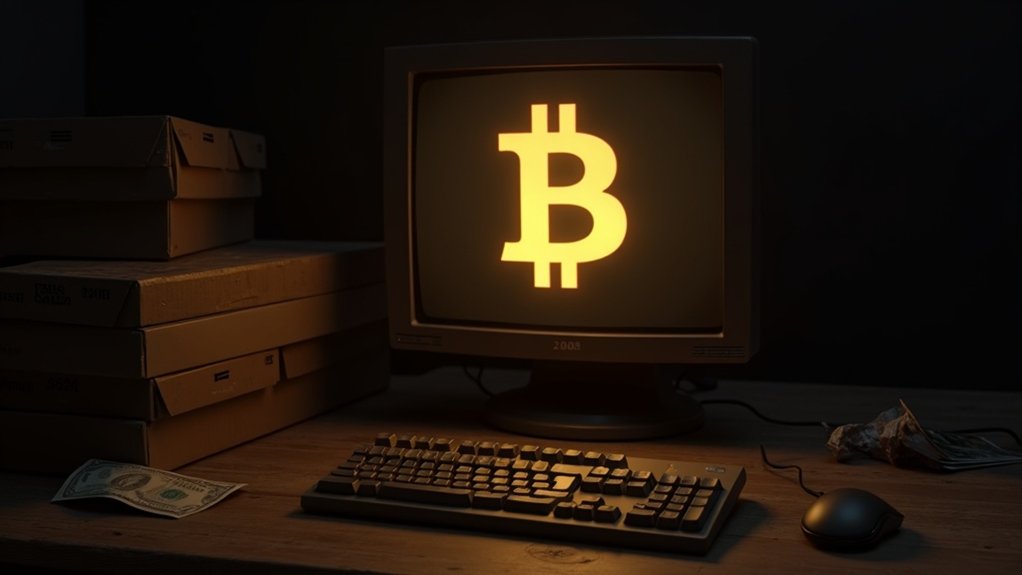Cryptocurrency exchanges are trading platforms where you buy, sell, and swap digital assets. They control your private keys. Wallets, on the other hand, are secure storage solutions where you maintain full custody of your crypto through private keys. Exchanges offer convenience and liquidity; wallets provide security and autonomy. Exchanges get hacked regularly. Hardware wallets keep keys offline. Smart investors use exchanges for trading but transfer to wallets for long-term storage. The difference could save your digital fortune.
While diving into the crypto world, newcomers face an immediate decision: wallet or exchange? It’s not just semantics. The distinction matters—a lot.
The choice between wallet and exchange isn’t academic—it’s the first crucial decision that shapes your entire crypto journey.
Exchanges serve as marketplaces where users trade digital assets. They’re slick, convenient platforms designed for buying, selling, and sometimes margin trading. But here’s the catch: they control your private keys. Your crypto? Not really yours until you move it elsewhere.
Wallets, on the other hand, prioritize secure storage. They’re digital vaults where users maintain full custody of their assets through private keys. Web wallets offer convenient browser-based access while maintaining user control. No middlemen. No permission needed to access your funds. Just pure, decentralized finance at work.
Hardware wallets take security further by storing keys offline, away from hackers’ greedy fingers. Many users choose hardware wallets for their superior security and control when storing significant amounts of cryptocurrency.
Let’s be frank. Exchanges get hacked. Regularly. Mt. Gox, Bitfinex, Coincheck—the crypto graveyard is filled with cautionary tales. When exchanges go down, your assets can vanish faster than free pizza at a college event.
Wallets aren’t immune to risks either, but they shift responsibility to the user. Lose your seed phrase? Congratulations, you’ve created an unintentional crypto donation to the void.
Convenience comes at a cost. Exchanges offer user-friendly interfaces and instant liquidity. Want to convert Bitcoin to cash? Click, done.
Wallets require more technical know-how but reward users with privacy and autonomy. No KYC forms. No waiting for withdrawal approvals. No explaining to exchange support why you need access to your own money.
The ecosystem needs both. Exchanges provide on-ramps for newcomers and liquidity for traders. Wallets deliver the decentralized promise that sparked the crypto revolution in the first place.
Smart investors use exchanges for what they’re good at—trading—then transfer assets to wallets for long-term storage. Many experienced crypto users maintain a balanced approach by keeping a portion of assets on exchanges for active trading while storing the majority in secure wallets.
The bottom line? Exchanges are for trading. Wallets are for holding. Use the right tool for the job, and maybe—just maybe—you’ll avoid becoming another crypto horror story.
Frequently Asked Questions
Can I Recover Lost Cryptocurrency if I Forget My Wallet Password?
Recovery depends entirely on wallet type.
With custodial wallets, yes – contact support.
With non-custodial wallets? Good luck.
No seed phrase means those coins are probably gone forever. Period.
Professional recovery services exist, but they’re hit or miss.
And watch out for scammers! They’re everywhere in crypto.
The harsh reality? Passwords matter less than seed phrases.
Lost both? Those digital coins might as well be floating in space now.
How Do Wallet Transaction Fees Compare to Exchange Fees?
Wallet fees are simply network costs—just blockchain transaction fees paid to miners. Way cheaper.
Exchanges? They pile it on: trading fees (0.1%-1.49%), withdrawal charges, deposit fees for fiat ($10-25), and still make you pay those same network fees.
Small transfers? Wallets win every time. Exchanges nickel-and-dime you from every angle.
Some cryptos like Nano have zero wallet fees. Exchanges never offer that kind of deal. Ever.
Are Hardware Wallets Worth the Investment for Small Cryptocurrency Holdings?
Hardware wallets aren’t usually worth it for small crypto holdings.
The math doesn’t work. Spending $50-$200 on a device to protect $100 in crypto? Not smart. They’re overkill for beginners with minimal assets.
Hot wallets work fine for small amounts. Yes, security is better with hardware, but complexity increases too.
Physical devices can be lost or damaged.
For serious investors with growing portfolios? Different story. Small-timers can upgrade later when their crypto grows.
Can Exchanges Freeze My Assets During Market Volatility?
Yes, exchanges absolutely can freeze assets during volatility. It happens more than people realize.
Exchanges have broad powers to pause trading or block withdrawals when markets go haywire. Circuit breakers kick in during extreme price swings.
Terms of service? Nobody reads them, but they all permit freezes. During these “timeouts,” users are stuck – can’t trade, can’t withdraw.
Market protection, they call it. Users? Just along for the ride.
What Happens to My Crypto if the Exchange Goes Bankrupt?
When an exchange goes bankrupt, users’ crypto typically becomes property of the bankruptcy estate. Period. Users transform into unsecured creditors—good luck with that status.
An automatic stay blocks withdrawals, and trustees can even claw back recent transfers.
Recovery? Uncertain at best, partial at worst. Bankruptcy proceedings prioritize exchange debts and legal fees before customer reimbursement.
Meanwhile, users wait… and wait. Many have lost billions in high-profile exchange collapses. Not exactly a happy ending.









